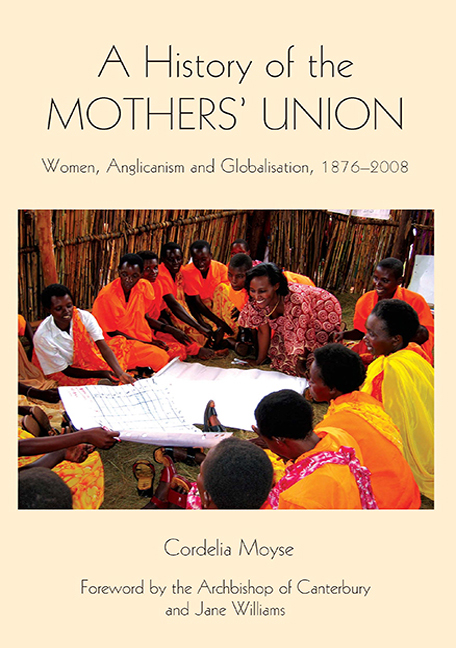Book contents
- Frontmatter
- Contents
- Dedication
- List of Illustrations
- Foreword by the Archbishop of Canterbury and Jane Williams
- Acknowledgements
- Abbreviations
- Introduction
- Part I 1876–1909
- Part II 1910–1944
- Part III 1945–1974
- 8 Identity and Spirituality
- 9 Marriage and Family Life
- 10 Membership and Worldwide Work
- Part IV 1975–2008
- Conclusion
- Appendix 1 Text of early membership cards
- Appendix 2 Development of the Mothers' Union prayer
- Appendix 3 Midday prayers (original)
- Appendix 4 Development of the objects
- Appendix 5 Biographical notes on central and worldwide presidents
- Bibliography
- Index
- Miscellaneous Endmatter
10 - Membership and Worldwide Work
from Part III - 1945–1974
Published online by Cambridge University Press: 29 April 2017
- Frontmatter
- Contents
- Dedication
- List of Illustrations
- Foreword by the Archbishop of Canterbury and Jane Williams
- Acknowledgements
- Abbreviations
- Introduction
- Part I 1876–1909
- Part II 1910–1944
- Part III 1945–1974
- 8 Identity and Spirituality
- 9 Marriage and Family Life
- 10 Membership and Worldwide Work
- Part IV 1975–2008
- Conclusion
- Appendix 1 Text of early membership cards
- Appendix 2 Development of the Mothers' Union prayer
- Appendix 3 Midday prayers (original)
- Appendix 4 Development of the objects
- Appendix 5 Biographical notes on central and worldwide presidents
- Bibliography
- Index
- Miscellaneous Endmatter
Summary
Adaptation, identity and loyalty were the key and increasingly interrelated issues the MU needed to address as a worldwide organisation in this period. Some form of adaptation was required for the post-war ecclesial and secular international environments in which the MU operated bore little resemblance to their pre-war counterparts. Ideas of independence and liberation took hold in non-Western countries which were once colonised or feudal societies with the result that as different peoples assumed new identities the political map of the world was redrawn. For the MU the single most dramatic event which affected its mission followed the establishment of the communist People's Republic of China in 1949 and the subsequent expulsion of missionaries. MU branches were disbanded and its workers were forced to withdraw from the mainland. Yet the most significant change for the organisation's long-term growth and identity was that most of its overseas membership no longer resided in British colonies and territories but in newly independent countries. In the process cultural ties and loyalties were in some cases cut asunder and in others worn thin by the struggle for independence.
At the same time as the political maps were changing the Church of England was also engaged in reordering its relationship to the Anglican flock around the globe. From 1951 under the leadership of Archbishop Fisher, for the first time outside the former white dominions, autonomous provinces were created across the Anglican Communion. Instead of being directly accountable to the archbishop of Canterbury, the dioceses of these provinces came under the jurisdiction of their local archbishop. The granting of ecclesial self-rule was one thing but the creation of a locally educated indigenous episcopate was to take longer. By the end of 1960 there were only seven black diocesan bishops in Africa. Episcopal and archiepiscopal leadership of the Anglican Communion outside the American Episcopal Church (PECUSA) was to remain the preserve of ‘the English’ for some time.
The MU, like the Church, began in this period to understand and work through the implications of operating in a post-colonial world. It recognised the need for indigenous training and leadership and by 1969, 80 of its 114 full-time workers were nationals of the countries in which they worked. Yet the central leadership was slow to comprehend that what was required was not simply a change of actors but a different script.
- Type
- Chapter
- Information
- A History of the Mothers' UnionWomen, Anglicanism and Globalisation, 1876–2008, pp. 202 - 220Publisher: Boydell & BrewerPrint publication year: 2009



